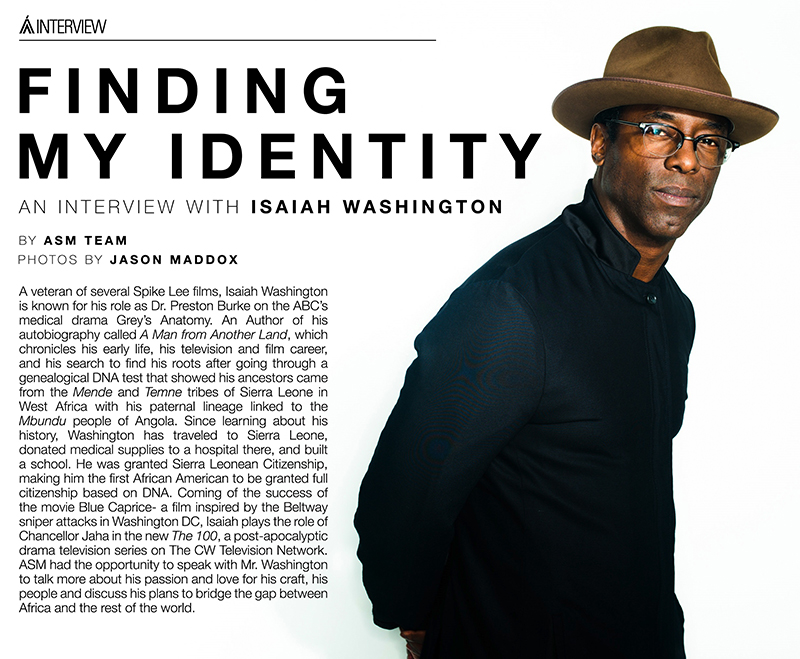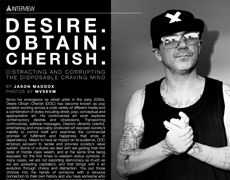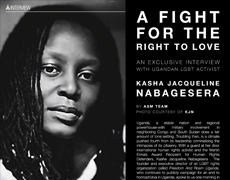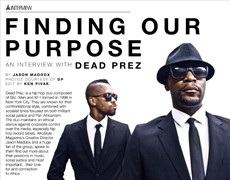A veteran of several Spike Lee films, Isaiah Washington is known for his role as Dr. Preston Burke on the ABC’s medical drama Grey’s Anatomy. An Author of his autobiography called A Man from Another Land, which chronicles his early life, his television and film career, and his search to find his roots after going through a genealogical DNA test that showed his ancestors came from the Mende and Temne tribes of Sierra Leone in West Africa with his paternal lineage linked to the Mbundu people of Angola. Since learning about his history, Washington has traveled to Sierra Leone, donated medical supplies to a hospital there, and built a school. He was granted Sierra Leonean Citizenship, making him the first African American to be granted full citizenship based on DNA. Coming of the success of the movie Blue Caprice- a film inspired by the Beltway sniper attacks in Washington DC, Isaiah plays the role of Chancellor Jaha in the new The 100, a post-apocalyptic drama television series on The CW Television Network. ASM had the opportunity to speak with Mr. Washington to talk more about his passion and love for his craft, his people and discuss his plans to bridge the gap between Africa and the rest of the world.
“…As I went through life searching and exploring, I started to learn about my people. At twenty three years of age, I did not know about anything about African people and many famous African Americans alike…”
ASM: What drew you to the Art of Acting?
IW: Acting actually found me. Growing up, I was a hard headed kid. I always questioned things; even when my mom would tell me not to. I questioned why shows exaggerated the characters of Black or African actors; it just did not make sense to me- something was not right. I started working as a Logistician for an aircraft parts company and had acquired quite a bit earning, about thirty five thousand a year in 1985. However, as time went on, I realized that it was not really what I wanted to do. I would consistently have a dream of me walking through this forest seeing these African children who looked just like me playing. Every time I would have this dream, I would always forget about it upon waking up- even if I tried to memorize or write it out. I left my good paying job and started hustling to feed myself. I sold pots, pans and watermelon kitchen clocks from the back of my car to make some kind of living. I did not want to get a job that I did not want and I did not want to go back to working in an industry I was not passionate about. As I went through life searching and exploring, I started to learn about my people. Believe it or not, at twenty three years of age, I did not know about anything about African people and many famous African Americans alike; from Kwame Nkrumah to James Baldwin, I was not familiar with either of them. I knew about Martin Luther King, because my mother talked so much about him and had a photo of him on her wall - but that was about it. It was when I was at Howard University when I was introduced to amazing books to read. I started to immerse myself in the literature of my people hence developing my love for Africa, theater and acting. In 1986, I decided to put myself on a ten year plan so that by 1996 if nothing tangible comes out of my quest to make a career out of acting, I would know to look at something else that would be of interest to me. Despite people’s disbelief in me -especially when I said that I will work with one of the biggest well known directors to hit the scene at the time, Spike Lee. By 1996 I had worked with Spike Lee on four films including Clockers and Get On The Bus. The reason I became an actor was because those people that I studied and read about not only in the books, but also in the scripts looked and spoke like me; they were different, they were intellectuals. I had never seen anything like it. And so that began my journey into the world of acting.
“…Despite people’s disbelief in me -especially when I said that I will work with one of the biggest well known directors...By 1996 I had worked on four films including Clockers and Get On The Bus…”
ASM: Now that you have been to Africa and have seen its beauty, why do you think there is still a little of tension between Africans and African Americans?
IW: “Image of Limited Good” is what anthropologists call what we call “black people hating to see other black people succeed.” What I have done in my lifetime, I had creative opportunities to address the trauma of being ashamed or confused of who we are. Someone who gave me one of the first books I read and got me interested in knowing more about my people, pointed out to me something very interesting. He said, Africans who live in the United Kingdom, are more English than the English in England and it drives the English crazy. That is not a good testament. But whatever we do as African people and of African descent, we do it well. What we have to do now is accept reality that we are African, but also an amalgamation of this colonization with the understanding that I am African who knows more and learned more about others than they know about me. I take that knowledge; mix it up to create a New Neo for Afro Politics. We are still suffering from the psychosis of what happened to us as a people. Just because one is African American does not mean he or she shares the same thoughts, ideals as an African. We get less attention, respect and praise on charitable works done in comparison to others. With that in mind, my goal is to love myself every day in my life, pass on that love to others I come in contact with whom I hope will in turn pass it on to others. In addition, create imagery from what I have learned and continue to learn each day; being as beautiful and as holistic as possible as I can and being satisfied with myself; showing that I can make a mistake and still recover like anyone else. Importantly being open minded to things around me; willing to learn from those who know more about home, ideologies more than I do. That’s why I do what I do and continue to do so. It is all about the Continent of Africa- especially West Africa. I am working on bridging the gap. One way of doing so is working to build a railroad that – extends from Morocco all the way to South Africa thereby attracting those over here to go see what is happening with our brothers and sisters over in Africa. I am looking to 2016 to be the year when things begin to move according to my plans on the Continent of Africa.
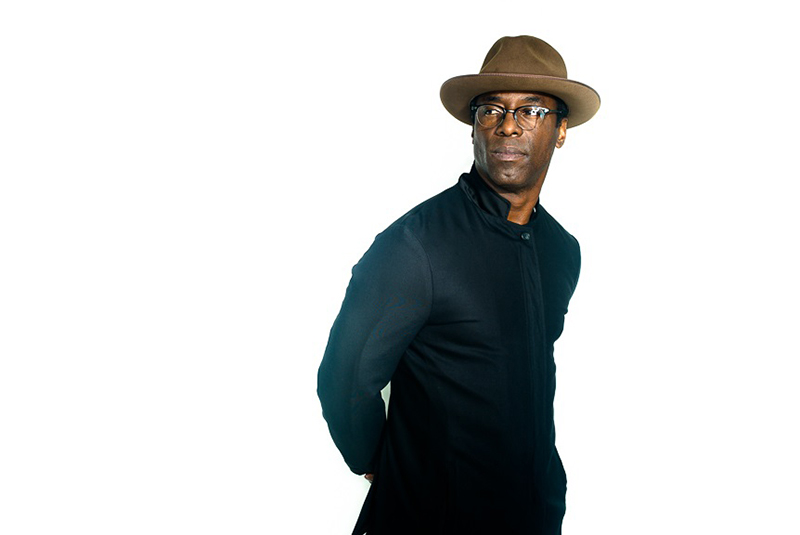
“…Marcus Garvey, Kwame Nkrumah and many others were my focus in Pan African studies. I just read every day, catching up on my African American history and the history of Africa….”
ASM: It seems like you are working to give everyone their history back. Can you tell us about that time in Texas when you started to become aware of the power of Media?
IW: I am trying to give people their history back as they see me embrace mine. With regards to the second question, it is hard to capsulate my answer into a sound bite but I will say that I have been fighting for the idea of Africa being at the forefront for a very long time. I have been fighting for respect for my skin color in the South my whole life and the fight is still going on today here and in different parts of the world. Colorism has become a part of Classism. Classism is the new game that we have to be aware of. Although some people may try to down play their ancestral background, but one cannot deny who he or she is- they really cannot.
ASM: What inspired your first DNA genetics and your connection to Sierra Leone?
IW: It was my dream that inspired me. The dream was guiding me the whole time; I just did not understand it. I did not have the intellect to understand what that meant back in Namibia in 1998. But when I began to understand the unbelievable, I spent a lot of time in life re-educating myself and not questioning what I do not understand. When you do not understand, you become suspicious. And so I spent the last fifteen years of my life of not being afraid of what I do not understand.
ASM: So what inspired your moving from shooting a movie in Namibia to becoming an activist in Sierra Leone?
IW: Marcus Garvey, Kwame Nkrumah and many others were my focus in Pan African studies at Howard University. I was opened up to this whole world; and so I just read every day, catching up on my African American history and the history of Africa. The more I knew, the more my hunger grew to not just know, but to also do something. I am still consistently helping get the “good word” out and spread in depth knowledge of Africa and its people out to those who know little. Some people have asked why I am so immersed in this work, because they say Africans are going out of their way to come to the United States. But I tell them that not all Africans are rushing out of Africa, willingly leaving their Motherland. Most Africans want to reach out to people like me, to get to know us, form a bond so to speak and find a common ground and that is what I am proud to do not just an American, but as an African- A Sierra Leonean.
ASM: As you look at your past, present and future, what do you want your legacy to be?
IW: He loved Africa (Kemet) and all of the good in humanity.

